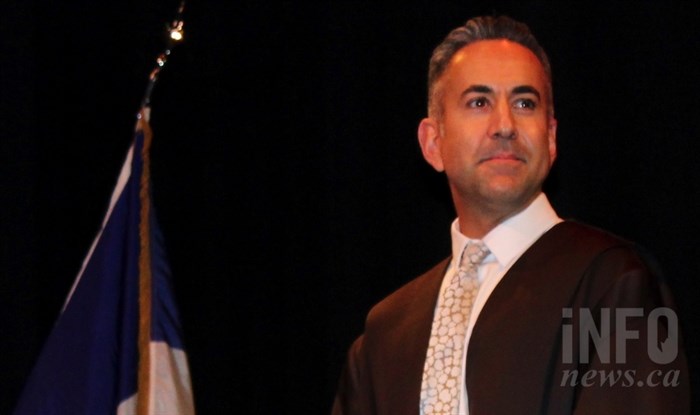
Kelowna Mayor Colin Basran
(ROB MUNRO / iNFOnews.ca)
May 12, 2020 - 6:30 PM
Most Kelowna residents can’t be bothered to go on-line to learn about new developments in their neighbourhoods.
That’s the opinion expressed by the majority of Kelowna city councillors yesterday, May 11, as they soundly defeated a staff recommendation to change the way information is handled on rezoning applications.
“Speaking anecdotally from the feedback I get, very few people that I converse with, who are concerned with something, went on line and actually read the staff report,” Mayor Colin Basran said
“Most people, I would say, arrive here at a public hearing because they had somebody circulate a petition in their neighbourhood with infactual (sic) information or they saw a post on Facebook or they, whatever. They didn’t read the staff report and they haven’t had any consultation directly with the applicant.”
That opinion was supported by six other councillors who joined Basran in voting against the proposed change.
“They don’t go on-line to look – not very many of them,” Coun. Charlie Hodge said. “They get there (to public hearings) because of what they were told, because of what their neighbour told them and they got a protest sign or they got misinformation. That’s largely why they arrive.”
Currently, when someone wants to rezone some land, they file an application with the city and staff present details of the application at a Monday afternoon council meeting. Councillors ask questions of staff and decide whether to reject the proposal or send it to public hearing.
At the Tuesday evening public hearings, which are usually two or three weeks later, applicants present their plans, city councillors ask questions then the floor is opened to the public.
The change proposed by staff was to let the applicant speak at the Monday afternoon session then only have the public speak at the public hearing. The applicant can respond at the end.
The public, staff said, could go on-line and watch a recording of the developer’s presentation before the public hearing. An education process would help them do that.
“As much education as we might want to do for the public, I don’t think it’s going be all that effective, to be honest,” Coun. Brad Sieben said. “The public will see the notification. They will sometimes respond emotionally to such developments. First reading almost provides a bit of a cooling off period. I don’t think we’re going to win it by educating the public. The public isn’t going to follow those processes."
On the other side of the debate were Councillors Gail Given and Luke Stack who both pointed out that the public can sometimes sit for up to an hour while council asks questions before getting their turn.
“I like the idea of putting the focus of the public hearing on the public and letting them speak,” Stack said. “If they come ill-prepared or whatever, that’s on them because the opportunities will all be there for them to see the presentations in advance and to read up on it.
“I generally find the public, if they have a particular issue and it’s in their neighbourhood, they’re pretty careful to prepare themselves and they’ll know the issues before they get here."
He argued that the new process was more respectful of the public
“The public came here to say something rather than hear us to jibber-jabber all night,” Stack said.
Given suggested that COVID-19 has had an impact on how people get information.
“Many things have changed in the last two months and many more things are going to change,” she said. “We’re becoming way more astute at how to get on-line and get accurate, valid information. Whether they will or they won’t, really is quite irrelevant. We still have the duty of having to hear their perspective.”
The idea of having the applicant speak at the start of the public hearing, as is currently the case, is to let those in attendance learn about what's being proposed and then make informed comments.
Most councillors feel that system is working just fine.
“When the public comes to a public hearing they have to be heard – they have to be seen to be heard,” Hodge said. “Quite frankly, I don’t care how long I have to stay at a public hearing. That is the one time when I am actively serving the public at a public hearing. I don’t care how long it takes for a public hearing to take place for the people to feel that they’ve been heard. Those people that are there to talk to council, they’re talking about their homes or their properties – the most important investment in their lives. They deserve to be heard."
To contact a reporter for this story, email Rob Munro or call 250-808-0143 or email the editor. You can also submit photos, videos or news tips to the newsroom and be entered to win a monthly prize draw.
We welcome your comments and opinions on our stories but play nice. We won't censor or delete comments unless they contain off-topic statements or links, unnecessary vulgarity, false facts, spam or obviously fake profiles. If you have any concerns about what you see in comments, email the editor in the link above.
News from © iNFOnews, 2020